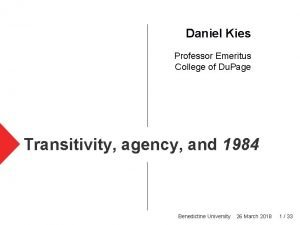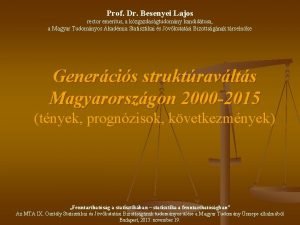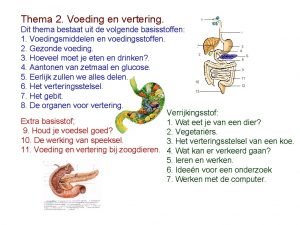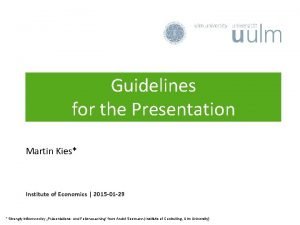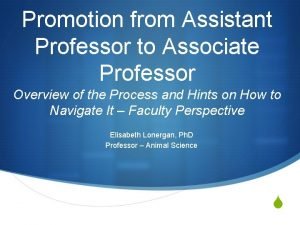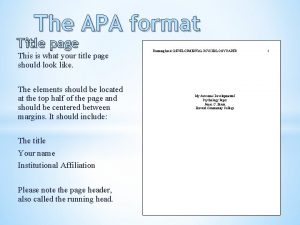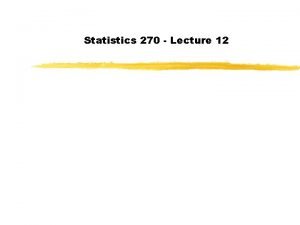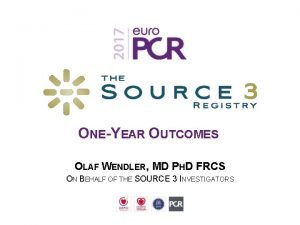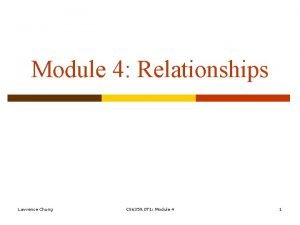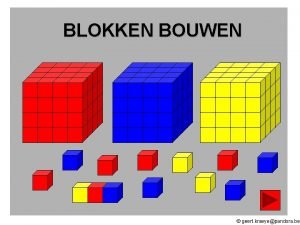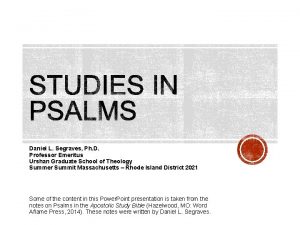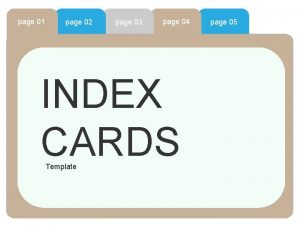Daniel Kies Professor Emeritus College of Du Page





















![Markers of agency 7/14 NEGATION a. John hit Bill. [positive assertion of agency] b. Markers of agency 7/14 NEGATION a. John hit Bill. [positive assertion of agency] b.](https://slidetodoc.com/presentation_image_h/0e58f3f09158c3dd8bae0b638c9cf6ea/image-22.jpg)
![Markers of agency 8/14 STATIVE VERBS/RESULTIVE VERBS a. John stopped. [ordinary intransitive verb] b. Markers of agency 8/14 STATIVE VERBS/RESULTIVE VERBS a. John stopped. [ordinary intransitive verb] b.](https://slidetodoc.com/presentation_image_h/0e58f3f09158c3dd8bae0b638c9cf6ea/image-23.jpg)




![Markers of agency 13/14 MODALITY SHIFTS a. John slapped the table. [ordinary, agentive transitive] Markers of agency 13/14 MODALITY SHIFTS a. John slapped the table. [ordinary, agentive transitive]](https://slidetodoc.com/presentation_image_h/0e58f3f09158c3dd8bae0b638c9cf6ea/image-28.jpg)





- Slides: 33

Daniel Kies Professor Emeritus College of Du. Page Transitivity, agency, and 1984 Benedictine University 26 March 2018 1 / 33

Prefatory Just as a painter uses paint and canvas to create the vision s/he has in mind, the writer uses language to create a vision, a world, in the reader’s mind. Two of the most commonly employed parts of the language that writers control to create their art are (1) the transitivity system and (2) the semantic space we call agency. Benedictine University 26 March 2018 2 / 33

Prefatory: transitivity Transitivity describes the syntactic and semantic relationships between the verb and other major clause-level constituents (subjects, objects, and complements). Subject Verb The water Don John Indirect object evaporat ed fired sent Mary Direct object Bob a. Benedictine letter. University Compleme nt 26 March 2018 3 / 33

Prefatory: transitivity & agency Transitivity influences agency. In the examples below, who did the actions highlighted in bold? 1. The window slowly, silently opened. 2. A voice spoke softly, warning to stay away. 3. No, John didn’t plan the burglary. 4. The murder of Bill upset everyone in the house. Notice how the grammatical choices in the sentences above hide agency through the manipulation of transitivity. Benedictine University 26 March 2018 4 / 33

Background In 1984, we see one of the best examples of how an author controls transitivity and agency to create a mood and style that promotes and matches the author’s larger themes. George Orwell, 1903 -1950, wrote Nineteen Eighty-Four (published as 1984 in the U. S. ) in 1948. The novel describes a world dominated by three superpowers – Oceania, Eurasia, and Eastasia. George Orwell Benedictine University 26 March 2018 5 / 33

The world of 1984 Benedictine University 26 March 2018 6 / 33

Problem In 1946, Orwell wrote a well-regarded essay called “Politics and the English Language. ” At the end of that essay, he offers six rules to improve writing. Rule four suggests “Never use the passive where you can use the active. ” In 1948, however, Orwell writes his novel 1984 filled with passive voice. Why? What created this apparent contradiction? Benedictine University 26 March 2018 7 / 33

Some posited explanations Some literary critics reason that his use of passive voice in the novel (Ringbom 1973: 11 -12, Petro 1982: 95, Bloom 1987: 1 -2) reflects the following: 1. He was journalist, and he was writing in a journalist’s style. 2. He rushed to finish the novel because of the “heat of his topic” and its echoes of WW 2’s end and of the cold war’s beginning. 3. He was dying. Benedictine University 26 March 2018 8 / 33

Orwell and those explanations The first two explanations just seem wrong. There is little evidence in his writing that his journalism or politics would have shaped (“damaged”) his verbal art in those ways. We should consider, however, the possibility that illness prevented him from crafting his prose more carefully. Benedictine University 26 March 2018 9 / 33

Orwell’s drafting the novel We know from photos and manuscripts of the novel that Orwell wrote on a typewriter while sitting at a table. At first, he would write the draft and make some changes with the typewriter, too. As the illness progressed, he drafted at the typewriter, but made changes by pencil. At the end, Orwell wrote and made changes with pencil and paper from bed. We can see an example on the next slide. Benedictine University 26 March 2018 10 / 33

Exerpt from the extant manuscript Benedictine University 26 March 2018 11 / 33

A bit of newspeak Orwell even would work small sections of the manuscript until he achieved the effect he desired. ''. . . it would comma in my opinion comma be vy unwise to proceed with the actual construction until the Committee is better informed abt the probable cost of machinery & other overheads stop end. '' (extant ms. ) ''. . . unproceed constructionwise antegetting plusfull estimates machinery overheads stop end message. '' (the final draft) Benedictine University 26 March 2018 12 / 33

Orwell on verbal art Thus, none of those explanation seem valid to me. Instead, the Orwell who wrote “What I have most wanted to do throughout the past ten years is to make political writing into an art. . I could not do the work of writing a book, or even a long magazine article, if it were not also an aesthetic experience” (CEJL 1: 6) must have been sensitive to the grammatical choices he was making, even while he was ill. Benedictine University 26 March 2018 13 / 33

Research project So if the literary critics were wrong, if the use of passive voice was Orwell’s deliberate choice, what advantages could such a choice offer Orwell in telling the story of 1984? We know that the passive reorganizes the transitivity patterns in English, as in the slides above. In changing transitivity patterns, passive also can change the semantics of what we call agency. Benedictine University 26 March 2018 14 / 33

The hypothesis Passive constructions allow writers to hide (and delete) attributions of agency – to hide the agent, the actor, the conscious initiator of action from the reader’s attention. If hiding agency is the goal of the heavy use of passive in the novel, we should see evidence that Orwell is employing other grammatical constructions to remove agency from the text. What are those other markers of agency? How do they compare to the use of English as a whole? Benedictine University 26 March 2018 15 / 33

Markers of agency 1/14 PASSIVES a. Bill hit John. [active voice, grammatical subject clearly expressing the agent] b. John was hit (by Bill). [passive voice, grammatical subject does not express agency; the agent is expressed through a prepositional phrase with by, if it is expressed at all] Examples: She described to him, almost as if she had seen or felt it, the stiffening of Katharine’s body as soon as he touched her, the way in which she still seemed to be pushing him from her with all her strength, even when her arms were clasped tightly around him. (NEF 110) The instrument (the telescreen it was called) could be dimmed, but there was no way of shutting it off completely. (NEF 6) Benedictine University 26 March 2018 16 / 33

Markers of agency 2/14 NOMINALIZATIONS a. Free radicals oxidize cell membranes quickly. b. The oxidation of cell membranes (by free radicals) was quick. [nominalization of the verb oxidize] Example: She described to him, almost as if she had seen or felt it, the stiffening of Katharine’s body as soon as he touched her. . (NEF 110) Benedictine University 26 March 2018 17 / 33

Markers of agency 3/14 INTRANSITIVES a. John opened the door. [transitive pattern, agent clearly identified in the clause] b. The door opened. [intransitive pattern, agent uncertain and thus suspense builds] Examples: Actually the idea had first floated into his head in the form of a vision of a glass paperweight mirrored by the surface of the gateleg. (NEF 114) The hallway smelt of boiled cabbage and old rag mats. (NEF 5) Benedictine University 26 March 2018 18 / 33

Markers of agency 4/14 PATIENTS AS SUBJECTS a. John sent a package. b. John got a package. [grammatical subject is agent, consciously initiates the action described in the predication] [grammatical subject is patient, the goal of the predication] Examples: . . . the rule was not strictly kept, because there were various things such as shoelaces and razor blades which it was impossible to get hold of. . (NEF 9) The old man had grown noticeably more cheerful after receiving the four dollars. Winston realized that he would have accepted three or even two. (NEF 81). . . look, I got a little packet of tea as well. (NEF 117) You will receive orders, and you will obey them. . (NEF 144) Benedictine University 26 March 2018 19 / 33

Markers of agency 5/14 DEPERSONALIZATION (Metonymy) a. John spoke. b. John’s voice spoke. A voice spoke. Examples: [Both sentences in (b) present a dehumanizing metonymy] . . . and it was possible that his features had not been perfectly under control. (NEF 54) A hand fell lightly on his shoulder. (NEF 99) The youthful body was strained against his own, the mass of dark hair was against his face. . . her youth and prettiness had frightened him (NEF 100) And the thought struck him. . (NEF 112) His mother’s anxious eyes were fixed on his face. (NEF 135) The telescreen barked at him to keep still. (NEF 191). . . a yell from the telescreen bade them be silent. (NEF 191) ‘Smith!’ yelled the voice from the telescreen. (NEF 193) Benedictine University 26 March 2018 20 / 33

Markers of agency 6/14 PERFECT ASPECT a. John wants to go. John wanted to go. b. John had wanted to go. [present tense expression of agent’s desire] [past tense, but still agent’s desire is relevant] [perfect aspect, agent’s desire no longer relevant to the present] Examples: . . . and it was possible that his features had not been perfectly under control. (NEF 54) Katharine, in any case, had long ceased to be a painful memory and become merely a distasteful one. (NEF 110) Unlike Winston, she had grasped the inner meaning of the Party’s sexual puritanism. (NEF 110) She had clasped her arms around his neck, she was calling him darling, precious one, loved one. He had pulled her down onto the ground, she was utterly unresisting. . (NEF 100) Benedictine University 26 March 2018 21 / 33
![Markers of agency 714 NEGATION a John hit Bill positive assertion of agency b Markers of agency 7/14 NEGATION a. John hit Bill. [positive assertion of agency] b.](https://slidetodoc.com/presentation_image_h/0e58f3f09158c3dd8bae0b638c9cf6ea/image-22.jpg)
Markers of agency 7/14 NEGATION a. John hit Bill. [positive assertion of agency] b. John didn’t hit Bill. [negated assertion undercuts agency] Examples: . . . so long as he stayed in his present position he could not be seen. (NEF 9) Unfortunately, he could not remember whether she had already been at that table when he arrived. . (NEF 54). . . and it was possible that his features had not been perfectly under control. (NEF 54) He still had not the courage to approach her. (NEF 99) In this game we’re playing, we can’t win. (NEF 112) He stopped, but he did not come back. (NEF 135) Benedictine University 26 March 2018 22 / 33
![Markers of agency 814 STATIVE VERBSRESULTIVE VERBS a John stopped ordinary intransitive verb b Markers of agency 8/14 STATIVE VERBS/RESULTIVE VERBS a. John stopped. [ordinary intransitive verb] b.](https://slidetodoc.com/presentation_image_h/0e58f3f09158c3dd8bae0b638c9cf6ea/image-23.jpg)
Markers of agency 8/14 STATIVE VERBS/RESULTIVE VERBS a. John stopped. [ordinary intransitive verb] b. John was stopped. [statal passives or resultive verbs suggests an ‘outside’ agency] Examples: Katharine, in any case, had long ceased to be a painful memory and become merely a distasteful one. (NEF 110) There had been times when consciousness. . . had stopped dead. . (NEF 198) Benedictine University 26 March 2018 23 / 33

Markers of agency 9/14 PRESENTATIONAL THERE STRUCTURES a. A man with a briefcase sat down. [agentive subject] b. There sat down a man with a briefcase. [agentive subject is de-emphasized in sentence medial position] Examples: There was nobody of whom they could ask the way. (NEF 111) Also notice Orwell’s use of negation in the grammatical subject above to further undercut any sense of agency. There was no evidence, only fleeting glimpses that might means anything or nothing. . (NEF 18) In a place like this, the danger that there was a hidden microphone was very small, and even if there was a microphone it would only pick up sounds. (NEF 112) Benedictine University 26 March 2018 24 / 33

Markers of agency 10/14 SUBJUNCTIVE MOOD a. I became a millionaire. [indicative mood = real world activity with real world consequences] b. If I became a millionaire, . . . [subjunctive mood = possible world only with no necessary suggestion of action in the real world] Examples: And it was exactly at this moment that the significant thing happened -- if, indeed, it did happen. (NEF 18) Some nosing zealot. . . might start wondering why he had been writing. . (NEF 27). . . and it was possible that his features had not been perfectly under control. (NEF 54) I would have, if I’d been the same person then as I am now. Or perhaps I would -- I’m not certain. (NEF 112) Benedictine University 26 March 2018 25 / 33

Markers of agency 11/14 LINKING VERBS like seem a. John has broken the window. [transitive verb with agentive subject] b. John seems to have broken the window. [linking verb, casting doubt on the agency of the grammatical subject] Examples: All this he seemed to see in the large eyes of his mother and his sister. . (NEF 29) There was a roar that seemed to make the pavement heave. . (NEF 72) Her body seemed to be pouring some of its youth and vigor into his. (NEF 113) Benedictine University 26 March 2018 26 / 33

Markers of agency 12/14 IMPERSONAL ONE and POINT-OF-VIEW SHIFTS a. I now can conclude that. . [first-personal pronoun clearly indicates agency and responsibility] b. One now can conclude that. . [impersonal third-person pronoun undercuts a clear sense of agency and responsibility for any conclusions] Examples: Instantly his face turned scarlet and water ran out of his eyes. The stuff was like nitric acid, and moreover, in swallowing it one had the sensation of being hit on the back of the head with a rubber club. (NEF 8) The smell was already filling the room, a rich hot smell which seemed like an emanation from his early childhood, but which one did occasionally meet with even now. . (NEF 117) Given this background, one could infer, if one did not know it already, the general structure of Oceanic society. (NEF 171) Benedictine University 26 March 2018 27 / 33
![Markers of agency 1314 MODALITY SHIFTS a John slapped the table ordinary agentive transitive Markers of agency 13/14 MODALITY SHIFTS a. John slapped the table. [ordinary, agentive transitive]](https://slidetodoc.com/presentation_image_h/0e58f3f09158c3dd8bae0b638c9cf6ea/image-28.jpg)
Markers of agency 13/14 MODALITY SHIFTS a. John slapped the table. [ordinary, agentive transitive] would should could b. John ought to slap the table. needs to might tried to [the modal/quasi-modal auxiliaries undercut the agency of the transitive verb] Examples: He [Winston] tried to squeeze out some childhood memory. . But it was no use, he could not remember. (NEF 7) If he could have been certain that O’Brien was lying, it would not have seemed to matter. … already he would have forgotten his denial of remembering it, … How could one be sure that it was simply trickery? (NEF 204) Benedictine University 26 March 2018 28 / 33

Markers of agency 14/14 EXISTENTIAL IT and other CLEFT SENTENCES a. John mailed the letter yesterday. [ordinary, agentive transitive] b. It was yesterday that John mailed the letter. It was the letter that John mailed yesterday. [a cleft sentence, using for example the existential it as grammatical subject in the main clause, allows for an information focus on one constituent, effectively undercutting the agency of the grammatical subject in the more usual, unmarked sentence pattern as in 14(a)] Examples: When one knew that any document was due for destruction, or even when one saw a scrap of waste paper lying about, it was an automatic action to lift the flap of the nearest memory hole and drop it in. . (NEF 35) What was even worse than having to focus his mind on a series of niggling jobs was the need to conceal his agitation from the telescreen. (NEF 90). . . it struck him for the first time that she was beautiful. (NEF 180) Benedictine University 26 March 2018 29 / 33

Comparing 1984 and references Benedictine University 26 March 2018 30 / 33

Orwell’s choices in concert Benedictine University 26 March 2018 31 / 33

Conclusion Manipulating transitivity and altering agency: theme > plot > character development > narration > style theme driving style (linguistic choices) throughout the novel Benedictine University 26 March 2018 32 / 33

References Ellegård, A. (1978), The Syntactic Structure of English Texts: A Computer-based Study of Four Kinds of Text in the Brown University Corpus, Goteborg, Sweden, Acta Universitatis Gothoburgensis. Francis, W. N. and Kučera, H. (1982), Frequency Analysis of English Usage: Lexicon and Grammar, Boston, Houghton Mifflin Company. Howe, I. (1982), ‘ 1984: History as Nightmare’, in Howe, I. (ed. ) Orwell’s Nineteen Eighty-Four: Text, Sources, Criticism, 2 nd ed. , New York, Harcourt Brace Jovanovich, 320 -332. Orwell, G. (1961), Nineteen Eighty-Four, New York, New American Library. . (1968), Collected Essays, Journalism, and Letters of George Orwell, Volumes 1 -4, Orwell, S. and Angus, I. (eds. ), New York, Harcourt, Brace, & World. . (1984), Nineteen Eighty-Four: The Facsimile of the Extant Manuscript, Davison, P. (ed. ), London, Secker & Warburg. Petro, P. (1982), Modern Satire: Four Studies, Berlin, Mouton. Ringbom, H. (1973), George Orwell as Essayist: A Stylistic Study, Abo, Finland, Acta Akademia Aboensis, series A, Vol. 44, no. 2. Benedictine University 26 March 2018 33 / 33
 Professor emeritus keith l. moore
Professor emeritus keith l. moore Regents professor emeritus
Regents professor emeritus Asu emeritus college
Asu emeritus college Daniel kies
Daniel kies Rector emeritus
Rector emeritus Lengtedoorsnede kies
Lengtedoorsnede kies Martin kies
Martin kies Promotion from associate professor to professor
Promotion from associate professor to professor Careminders franchise reviews
Careminders franchise reviews Apa title
Apa title A college professor never finishes his lecture
A college professor never finishes his lecture Pronote college daniel faucher espace eleves
Pronote college daniel faucher espace eleves Pronote eleves ubelka
Pronote eleves ubelka College daniel faucher pronote
College daniel faucher pronote Asd college college readiness program
Asd college college readiness program Early college high school at midland college
Early college high school at midland college Professor agamenon roberto
Professor agamenon roberto How to write a formal email to teacher
How to write a formal email to teacher Professor capitalized
Professor capitalized Ppgea ufrrj
Ppgea ufrrj Richard quinn ucf
Richard quinn ucf Ruth guthrie rate my professor
Ruth guthrie rate my professor The professor and his beloved equation
The professor and his beloved equation Professor mso afskaffes
Professor mso afskaffes Mattie is a new sociology professor
Mattie is a new sociology professor Terry loves his wife and so do i.
Terry loves his wife and so do i. Edley fontes
Edley fontes Professor edley
Professor edley Brian peskin parent essential oils
Brian peskin parent essential oils Olaf wendler
Olaf wendler O bom professor
O bom professor Professor jan papy
Professor jan papy Lawrence chung rate my professor
Lawrence chung rate my professor Professor agamenon roberto
Professor agamenon roberto



